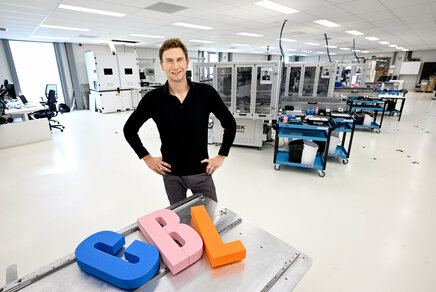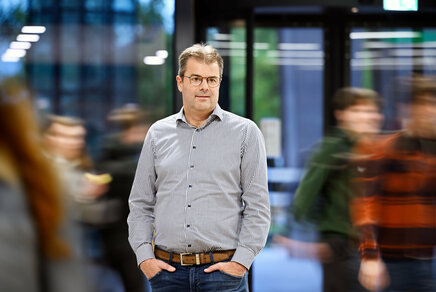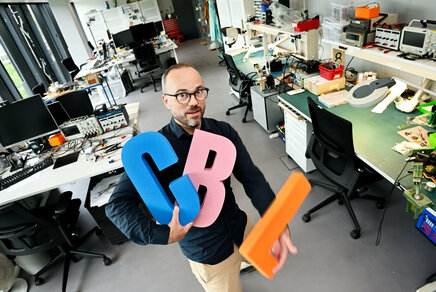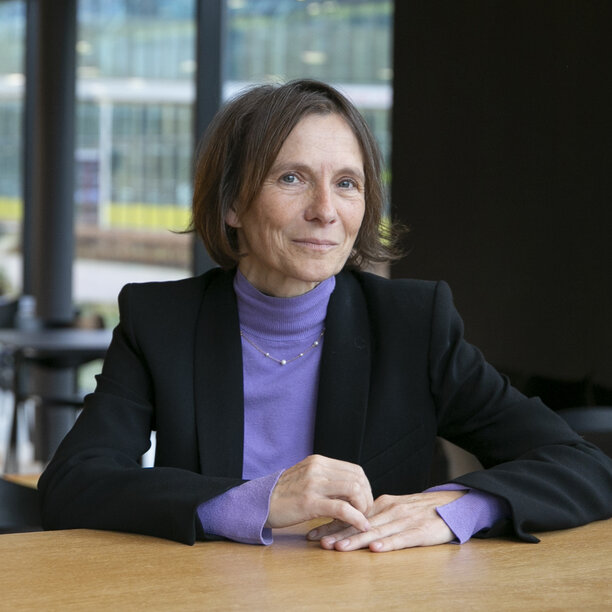‘I want to be part of the group, not sit in an ivory tower’
Silvia Lenaerts, TU/e's new rector magnificus, is enthusiastic about getting started at Eindhoven. Social safety and sustainability are themes she believes are important.
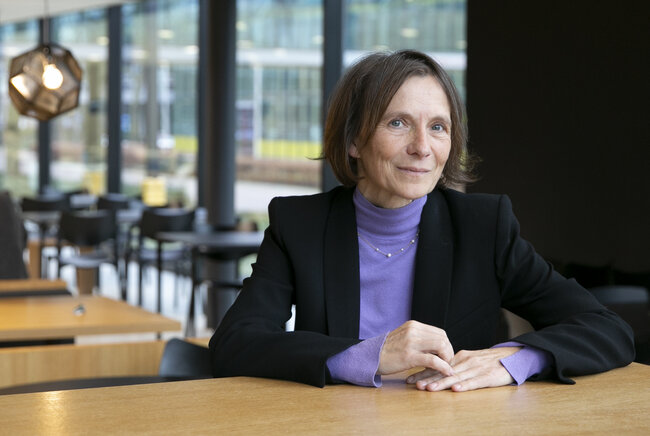
She's no fan of political games, says of herself that she's blunt, a trait she identifies with the Dutch, and she's open and approachable. On May 11th the Belgian Silvia Lenaerts (56) becomes TU/e's new rector magnificus. An introduction to a woman who's keen to be part of the group and who's almost un-Belgian in her directness.
Silvia Lenaerts called up her parents; it was the first thing she did after a headhunter asked her whether she'd be interested in the position of rector magnificus of TU/e. “I've been offered a job in Eindhoven! It felt good from the get-go,” says Lenaerts, sitting in Brownies&downies in Atlas, a cup of coffee before her. For the interview, she has come to Eindhoven from Antwerp, where until May she’ll stay in post as a professor and as Vice-rector for Valorisation & Development.
On May 11th she'll be officially installed as the new rector magnificus of TU/e, the fifteenth since the university's founding. And the first woman to hold this position at any university of technology in the Netherlands. “My feelings about that are mixed,” she says firmly. “It's incredible and I'm very happy about it, but to be the first woman after all these years, that's very telling. I was the first woman when I started work after completing my studies in Chemistry. Throughout my career I've often been the first or only woman. And now it's the same again.” She emphasizes the necessity of TU/e's Irène Curie Fellowship program, which prioritizes women candidates when academic vacancies are being filled. “There's still plenty that needs to be put to rights, so it's important that TU/e is working on this.”
Someone once said to me, ‘You're very accessible, people find it easy to approach you’. I hope to create that sense here too.
Silvia Lenaerts, TU/e's new rector magnificus
Lenaerts aims to become an approachable rector, someone who's part of the group. “I want to bring people together, be open to whatever our evermore rapidly changing society has to offer, and provide representation for as many people as possible. Someone once said to me that I'm very accessible and people find it easy to approach me. That's the sense I want to create here too.”
Positivity, cooperation, and diversity are important core values for the new rector. “I strongly believe that many wonderful things can arise when you bring together people from different backgrounds who don't share the same education and context. I don't do cooperation for its own sake. I want everyone to get something out of it. For us all to be looking at how we can grow.”
Air purification
After completing her doctoral research at IMEC, where she worked on sensors for gas turbines as part of a European project, Lenaerts spent a number of years in industry working on air purification. Twice, she set up a new enterprise: a startup to develop gas sensors used to measure and reduce air pollution; and a new division to develop catalyzers for purifying air in the waste processing sector.
“There came a point when I missed research, felt drawn to delve more deeply, discover new things. The academic world provides ample scope for satisfying this curiosity,” says Lenaerts. She returned to the University of Antwerp, where she set up a new bio-engineering degree program, with a strong chemistry component.
In 2007 she started her own research group from scratch: the Sustainable Energy, Air and Water Technology Group (with the acronym DuEL, in Dutch). “That was probably the biggest challenge I've ever taken on. I wanted to do something new but had no premises, no money, no people, nothing.”
More than ten years later her group has grown from zero to fifty researchers, all working on sustainable, circular solutions to energy issues. “We started with air purification and photocatalysis; the focus on the circular aspect came later. It's important not just to take things down, but also to build them back better. I also want to use solar energy to purify air. We work with government agencies, businesses, and academic partners. I think it's enormously important to give the knowledge that's accumulated back to society, to create value.”
Chemistry is unknown and unexpected, it's chaotic. It's never boring.
Silvia Lenaerts, TU/e's new rector magnificus
Chemistry's complexity still appeals to Lenaerts. “There's something unknown, unexpected, chaotic about it. This makes chemistry an adventurous field of work, one where new things are still being discovered. It's never boring.”
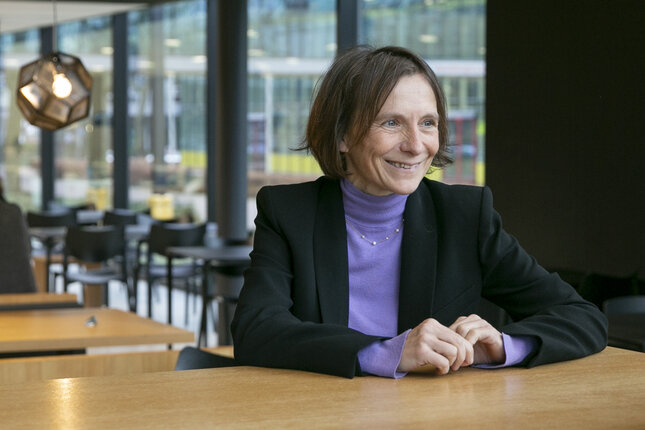
Hierarchy
When asked about the cultural differences between the Netherlands and Belgium, it's evident that Belgian-born Lenaerts leans more towards the Dutch way of doing things. She is open, direct, and detests hierarchy - or as she says, using the Belgian idiom, 'I wouldn't even wipe my feet on it.’ She prefers to be addressed informally as Silvia or 'you', avoiding the formal form of ‘you’ in the Dutch language.
“I don't want to become isolated because I hold a certain position. I want to know what's going on among the university's students and employees. I want to hear from them what we need to be focusing on. I'm committed to maintaining this openness. I want to be part of the group, not sitting in the proverbial ivory tower. I want to be grounded in society and in what's actually going on.”
It's not a problem if we disagree, but I would like us to say so to each other's face, so that we can move straight on to finding solutions.
Silvia Lenaerts, TU/e's new rector magnificus
Her directness is refreshing and it's almost un-Belgian. She laughs at the Belgian expression een franke toot hebben (being plain-spoken or blunt), something the Belgians sometimes accuse the Dutch of being. “It applies to me too, I'm blunt, although it’s not always appreciated by my fellow Belgians,” she says. “I'm direct and open, and I really like that this is so highly rated in the Netherlands. I want to present a true picture of who I am; I don't have it in me to do otherwise.”
Lenaerts describes herself as purposeful and a good listener. “I can take criticism and like to make compromises, and I always go into a discussion with an open mind.” She expects the same attitude of others. “It's not a problem if we disagree, but I would like us to say so to each other's face, so that we can move straight on to finding solutions.”
Perfect timing
The vacancy for rector magnificus in Eindhoven came at just the right time for Lenaerts. “This year, 2023, is my twentieth year at the University of Antwerp, and I've always had plenty of opportunities there. But I said to myself that either I'd stand for the position of rector in Antwerp or I'd leave.”
At Belgian universities the rectorship is decided by elections. “The elections are accompanied by a lot of politicking, which starts well in advance.” She hesitated about joining this political process. “Do I want to spend a year of my life on this? I'm someone who likes to be moving forward, but I find the political process paralyzing.”
So when she was asked whether she was interested in becoming the rector of Eindhoven, Lenaerts was immediately intrigued and interested. “Like TU/e, I believe in cooperation and solutions.”
I'll be letting go of the science. It's about TU/e now, not my research.
Silvia Lenaerts, TU/e's new rector magnificus
In Antwerp, as well as being a vice-rector, Lenaerts is also a professor with her own group, but here she'll be focusing fully on the rectorship. “I'll be letting go of the science. It's about TU/e now, not my research. Over the past six years I've been working on a team and now they can go on without me. It's something we've discussed. I still have two doctoral candidates who I'll supervise until their public defense, and then I can let it go.”
This letting go is a deliberate choice. “My challenge in Antwerp was having to constantly divide my attention between my vice-rectorship, my group, and chairing the Institute of Environment and Sustainable Development. I'm happy that I can now devote myself entirely to just one thing. I'm looking forward to hitting the ground running.” Lenaerts’ will be scaling down her impressive list of ancillary activities - she sits on twelve executive boards in Belgium - to just two.
She is pleased that her portfolio as rector includes education and research. “I'll still be keenly interested in research of course, and I'll be taking a close interest in everything that's happening here in Eindhoven.”
Sustainable intentions
Naturally, Lenaerts will be bringing her focus on sustainability with her to Eindhoven. “For me, sustainability is a no-brainer. To my mind, as a university, we should be setting an example for society. We have our own excellent science and fabulous technologies, but we must listen to want society wants, what's needed. So that working with citizens, businesses, and policymakers, TU/e can come up with sustainable solutions.”
Social safety is another issue she believes is important. “To want to come to work, people must feel well and safe. This is something that needs our attention, and I'm happy to take it on, with the help of professionals.”
Gradual growth
The University of Antwerp has more than 21,000 students, a number our university aspires to reach in the future. “It's an interesting size,” says Lenaerts. “People still know each other, but you have enough critical mass to be part of the discussion at an international level. It's important that we keep the lines short and the approach personal.”
She's happy with the four conditions for growth the university has set in response to the Brainport region's request that more engineers be produced to fill its growing number of vacancies. “You have to keep your people on side as you grow, and growth must be gradual, and achieved without compromising on excellence. If growth is approached like this, I've no doubt it's possible. The important thing is that we act together. There can't be any chasing growth for its own sake, but if you want to have more impact, you have to grow. Eindhoven is innovative, focused on the future and cooperation with industry and citizens, and it's this innovative character that makes Eindhoven so strong.”
Media contact
More on our strategy
